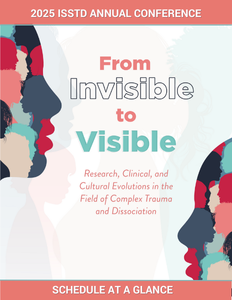Back
Single Paper or Case Study
Paper Session #3
Cultural Betrayal Trauma & (Intra)Cultural Support on Dissociation for Black American YA
Sunday, March 16, 2025
1:30 PM – 3:00 PM US Eastern Time
Learning Level: Beginning
- JG
Jennifer M. Gómez, PhD
Assistant Professor
Boston University
Boston, Massachusetts, United States
Abstract
Background & Purpose
As a Black feminist and critical race framework created by a Black American woman (Gómez), cultural betrayal trauma theory (CBTT) is a scientific theory that incorporates the context of inequality into the study of violence. CBTT proposes that (intra)cultural trust, such as solidarity in the Black community, is a protective factor against racism. As a violation of (intra)cultural trust, within-group violence is a cultural betrayal trauma that is associated with diverse outcomes, such as dissociation and internalized prejudice. Importantly, Black people engage in (intra)cultural support, such as talking through the pros and cons of engaging with police given the conflicting needs of protecting the Black community from discrimination and protecting oneself from further danger; (intra)cultural support may in turn be associated with posttraumatic growth. Therefore, the purpose of the current study is to examine the roles of cultural betrayal trauma and (intra)cultural support on dissociation for Black American young adults.
Methods
Participants (N =1339) were Black American young adults between the ages of 18 and 30 were recruited from the Prolific Academic, an online platform dedicated to academic research. At a location of their own choosing, participants completed a 60-minute online survey. This study comes from a larger data collection (PI: Gómez, ENRICH Study: Experimental Study of Violence & Race in High School); only measures relevant to the current study are reported which included Gómez & Johnson’s Cultural Betrayal Multidimensional Inventory for Black American Young Adults (CBMI-BAYA), with questionnaires assessing cultural betrayal trauma, (intra)cultural support, and posttraumatic growth and Elliott & Briere’s Trauma Symptom Checklist, a 40-item questionnaire that assesses trauma-related mental health
Anticipated Results
With the data already collected, we hypothesize that cultural betrayal trauma will be associated with dissociation, while controlling for between-group trauma. We also hypothesize that, while controlling for between-group trauma, (intra)cultural support will moderate the association between cultural betrayal trauma and dissociation, such that those with (intra)cultural support will have less dissociation.
Conclusions & Implications.
Complex trauma and dissociation among Black American young adults represent profound community-based challenges, occurring amidst societal discrimination and cultural dynamics. This study aims to examine whether experiences of cultural betrayal trauma among Black American young adults are linked to dissociation. Additionally, it seeks to assess for survivors of cultural betrayal, (intra)cultural support is linked with decreased dissociation, which future studies examining if (intra)cultural support can be leveraged for healing. These insights are crucial for developing interventions that recognize the diverse experiences of survivors, address the unique needs of the Black community, and foster collective healing and societal change.
Background & Purpose
As a Black feminist and critical race framework created by a Black American woman (Gómez), cultural betrayal trauma theory (CBTT) is a scientific theory that incorporates the context of inequality into the study of violence. CBTT proposes that (intra)cultural trust, such as solidarity in the Black community, is a protective factor against racism. As a violation of (intra)cultural trust, within-group violence is a cultural betrayal trauma that is associated with diverse outcomes, such as dissociation and internalized prejudice. Importantly, Black people engage in (intra)cultural support, such as talking through the pros and cons of engaging with police given the conflicting needs of protecting the Black community from discrimination and protecting oneself from further danger; (intra)cultural support may in turn be associated with posttraumatic growth. Therefore, the purpose of the current study is to examine the roles of cultural betrayal trauma and (intra)cultural support on dissociation for Black American young adults.
Methods
Participants (N =1339) were Black American young adults between the ages of 18 and 30 were recruited from the Prolific Academic, an online platform dedicated to academic research. At a location of their own choosing, participants completed a 60-minute online survey. This study comes from a larger data collection (PI: Gómez, ENRICH Study: Experimental Study of Violence & Race in High School); only measures relevant to the current study are reported which included Gómez & Johnson’s Cultural Betrayal Multidimensional Inventory for Black American Young Adults (CBMI-BAYA), with questionnaires assessing cultural betrayal trauma, (intra)cultural support, and posttraumatic growth and Elliott & Briere’s Trauma Symptom Checklist, a 40-item questionnaire that assesses trauma-related mental health
Anticipated Results
With the data already collected, we hypothesize that cultural betrayal trauma will be associated with dissociation, while controlling for between-group trauma. We also hypothesize that, while controlling for between-group trauma, (intra)cultural support will moderate the association between cultural betrayal trauma and dissociation, such that those with (intra)cultural support will have less dissociation.
Conclusions & Implications.
Complex trauma and dissociation among Black American young adults represent profound community-based challenges, occurring amidst societal discrimination and cultural dynamics. This study aims to examine whether experiences of cultural betrayal trauma among Black American young adults are linked to dissociation. Additionally, it seeks to assess for survivors of cultural betrayal, (intra)cultural support is linked with decreased dissociation, which future studies examining if (intra)cultural support can be leveraged for healing. These insights are crucial for developing interventions that recognize the diverse experiences of survivors, address the unique needs of the Black community, and foster collective healing and societal change.
Learning Objectives:
At the conclusion of this session participants will be able to:
- Describe key elements of cultural betrayal trauma theory (CBTT)
- Apply cultural betrayal trauma theory (CBTT) to the study of complex trauma and dissociation in Black American young adults
- Evaluate the impact of cultural betrayal trauma and (intra)cultural support on dissociation
- Identify the specific ways in which cultural betrayal trauma manifests within the Black community
- Analyze how (intra)cultural support impacts the well-being of Black American young adults

